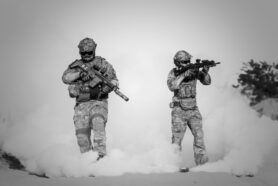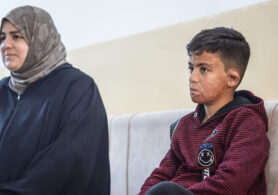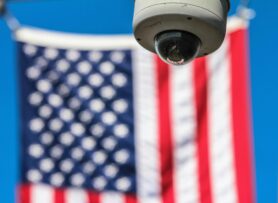The Battle for Aleppo lasted four long years from the beginning of the Syrian revolution in July 2012 to its recapture by Syrian government forces in July 2016. Over this period, the ebb and flow of violence from above, whether from crudely-fashioned barrel bombs or Russian airstrikes, reduced swathes of the city to rubble. Approximately 23,000 civilians were killed and countless more were displaced in what has come to be known as one of modern warfare’s most horrifying sieges. Behind every one of these civilian casualties was a human story, many of which will never be told.
Amidst the terror and chaos of this conflict, however, filmmaker Waad Al-Kateab recorded every moment, documented here in For Sama. Narrated as a letter to her infant daughter, Sama, this film moves backwards and forwards from the sanguine early days of the revolution at the University of Aleppo, where Al-Kateab and her partner were students, to the desperate circumstances of their departure from the city four years later. The result is a heartbreakingly intimate portrait of motherhood under impossible circumstances. As her husband, Hamza Al-Kateab, works around the clock in one of Aleppo’s few remaining hospitals, Waad and her camera bear witness to the unending horror of a city under siege.
For Sama is difficult to watch. Largely shot from a first person perspective – at times resembling something more like a home movie than the award-winning documentary it is – it forces the viewer into the heart of a conflict considered distant to most. Scenes of young children rushed into hospital and surgeons conducting an emergency caesarean on a pregnant woman testify to the indiscriminate nature of the bombing in Aleppo. Some of the most intensely emotional moments in For Sama, however, are the least violent: the calm dissonance of children playing in a burnt out school bus, or Al-Kateab putting Sama to bed as bombs fall outside. These brief moments of escape serve as moving reminders of life at a time of overwhelming grief.
Stories of civilian harm too often go untold. And stories of war, more generally, are seldom told from a woman’s perspective. In this regard, For Sama is a welcome exception. While the courage and determination of the medical staff involved is self-evident, this is not a tale of heroism. What makes For Sama so powerful is its intensely human qualities. The impossible decisions and moral agony over deciding whether to stay or go cannot be glorified. There lies the power of this documentary, which deftly contextualises the personal in the political. For Sama makes for uncomfortable but essential viewing. There is no doubt it deserves recognition as one of the most powerful records of civilian harm in modern conflict.
Source:



